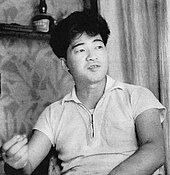Kōbō Abe
Apariencia
| Kōbō Abe | |||||||||||
|---|---|---|---|---|---|---|---|---|---|---|---|
 «La libertad no consiste sólo en seguir la propia voluntad, sino también a veces en huir de ella». |
|||||||||||
| Véase también | |||||||||||
| Esta página contiene citas de una persona fallecida hace 31 años. | |||||||||||
| Dependiendo de cómo se publicaran, pueden estar protegidas por derechos de autor. Deben usarse según las políticas de licencias de Wikiquote. | |||||||||||
Kōbō Abe (Kita, Tokio, 7 de marzo de 1924 – ibidem, 22 de enero de 1993), seudónimo de Kimifusa Abe, fue un escritor, cineasta y fotógrafo japonés.
Citas
[editar | editar código]- «Cada uno tiene su propia filosofía que no vale para nadie más».
[Everyone has his own philosophy that doesn't hold good for anybody else].[1]
- «Cualquier extraño es para ti simplemente un espejo en el que reflejarte».
[Any stranger is for you simply a mirror in which to reflect yourself].[2]
- «El carácter de los retratos ha cambiado con el tiempo. La armonía clásica entre la cara y el corazón fue reemplazada poco a poco por la expresión discordante de la individualidad».[3][4]
- «El sufrimiento de la prisión reside en el hecho de que no puedes, en ningún momento, evadirte de ti mismo».[5]
- «La libertad no consiste solamente en seguir la propia voluntad, sino también a veces en rehuirla».[6][7]
- «La soledad es un infierno para los que intentan salir de ella; es también una felicidad para los ermitaños que se esconden».[8][9][10]
- «Una gran simpatía por los demás proviene de un alto grado de adhesión a uno mismo».[11]
Fragmentos literarios
[editar | editar código]- «No había un solo elemento de importancia [en el periódico]. Una torre de espejismos, toda ella, hecha de ladrillos ilusorios y llena de agujeros. Si la vida estuviera hecha solo de cosas importantes, realmente sería una peligrosa casa de cristal, que difícilmente se manejaría descuidadamente. Pero la vida cotidiana era exactamente como los titulares. Y así, todos, conociendo la falta de sentido de la existencia, establecen el centro de su brújula en su propio hogar».
[There wasn't a single item of importance [in the newspaper]. A tower of illusion, all of it, made of illusory bricks and full of holes. If life were made up only of important things, it really would be a dangerous house of glass, scarcely to be handled carelessly. But everyday life was exactly like the headlines. And so everybody, knowing the meaninglessness of existence, sets the center of his compass at his own home].[12]
- «No podía prescindir de la repetición en la vida, como el latido del corazón, pero también era cierto que el latido del corazón no era todo lo que había en la vida».
[Could not do without repetition in life, like the beating of the heart, but it was also true that the beating of the heart was not all there was to life].[13]
- «Quería creer que su propia falta de movimiento había detenido todo movimiento en el mundo, la forma en que una rana en hibernación elimina el invierno».
[He wanted to believe that his own lack of movement had stopped all movement in the world, the way a hibernating frog abolishes winter].[14]
Referencias
[editar | editar código]- ↑ The Woman in the Dunes. Vintage International. Kobo Abe. Editorial Knopf Doubleday Publishing Group, 2011. ISBN 9780307813732. Página 65.
- ↑ The Face of Another. Knopf Doubleday Publishing Group, 2011. p. 224; ISBN 9780307813725.
- ↑ Bartra (1994), p. 167.
- ↑ La cara de otro, 1969. Albaigès (1997), p. .
- ↑ Bartra (1994), p. 167.
- ↑ Bartra (1994), p. 168.
- ↑ Albaigès (1997), p. 168.
- ↑ Bartra (1994), p. 167.
- ↑ Señor (1997), p. 491.
- ↑ Albaigès (1997), p. 553. En La cara de otro (1969).
- ↑ Albaigès (1997), p. 437. La cara de otro, 1969
- ↑ The Woman in the Dunes. Vintage International. Kobo Abe. Editorial Knopf Doubleday Publishing Group, 2011. ISBN 9780307813732. Página 94.
- ↑ The woman in the dunes. UNESCO collection of representative works. Japanese series. Kōbō Abe. Editorial Knopf, 1964. Página 177.
- ↑ The Woman in the Dunes. Vintage International. Kobo Abe. Editorial Knopf Doubleday Publishing Group, 2011. ISBN 9780307813732. Página 94.
Bibliografía
[editar | editar código]- Albaigès, Josep María (1997). Un siglo de citas. Planeta. ISBN 8423992543.
- Bartra (datos.bne). Frases y citas célebres. Grijalbo. p. 167. ISBN 8425315263.
- Señor, Luis (1ª ed. 1997 / 2017). Diccionario de citas. Espasa Calpe. ISBN 8423992543.
